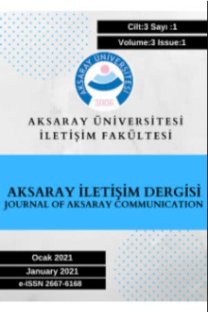İstanbul'da Yaşayan Senegalli Göçmenlerin Sosyal ve Kültürel Entegrasyonu
Bu makalede, Türkiye’de, özellikle İstanbul’da, ikamet eden Senegalli göçmenlerin entegrasyon sürecinde kültürel ve sosyal alanlarda yaşadıkları zorluklar anlatılmıştır. Bu amaçla, Türk toplumuna entegrasyon aşamasındaki göçmenlerin çevresi, duyguları ve topluma yönelik algılarıyla birlikte, entegrasyonda kullandıkları bireysel ve kolektif stratejiler incelenecektir. Bireyi (göçmen) odak noktası olarak kabul eden bu bakış açısı, toplumsal kabul sürecinin dinamiğini sağlayan faktörleri analiz etmeye iter. Bu doğrultuda İstanbul’da ikamet eden Senegallilerin durumunun incelenmesi için Georges Mead’in (1963) « sembolik etkileşimcilik » kavramı referans alınmıştır. Bu çalışmada göçmenlerin entegrasyon aşamasında kullandıkları stratejilerin, toplumsal kabul ve uyum sürecini nasıl etkilediği, özellikle göçmenlerin uyum sağlayacakları çevre ile nasıl bir etkileşim içinde oldukları ve kimliksel gelişimlerinin nasıl etkilendiği sorularına cevap verilmeye çalışılmıştır. İstanbul’da ikamet eden 52 Senegalli göçmenle yapılan röportajlar ve teorik veriler karşılaştırıldıktan sonra, toplumsal kabul ve uyum sürecindeki Senegalli göçmenlerin çoğunun kaynak ülkenin (Senegal) sosyal ve kültürel referanslarıyla etkileşim hâlinde oldukları sonucuna varılmıştır. Bu durum, Türkiye’deki, özellikle İstanbul’daki, topluma etkin entegrasyon sürecini sınırlamaktadır.
Anahtar Kelimeler:
Göçmenler, Entegrasyon, Toplum, Senegal, Turkiye
Social and Cultural Integration of Senegalese Immigrants Living in Istanbul
This article describes the cultural and social difficulties that accompany the integration process of Senegalese immigrants, particularly those who have settled in the city of Istanbul. More specifically, it examines the immigrants' environment, their feelings, perceptions, and motivations, as well as the individual and collective strategies they use to integrate into Turkish society. Such a perspective necessarily places the individual at the center of our concerns and seeks to analyze the factors that ensure the dynamics of his or her progress in the host society. To do this, support was taken from the concept of symbolic interactionism of George Mead (1963) an application with the experience of Senegalese settled in the city of Istanbul. It aims to try answer the following question: How do the coping strategies implemented by immigrants influence the outcome of their integration process in the host society? More precisely, how do immigrants interact with the host environment and the identity processes they develop there? After comparing the theoretical data with the interview data of 52 Senegalese migrants in Istanbul, it was concluded that most Senegalese immigrants interact with the social and cultural references of their country of origin to integrate into the host society. Therefore, this limits their effective integration in Turkey.
Keywords:
Turkey Turkey, Senegal, Immigrants, Integration, Society,
___
Begag, Azouz. (2003). L'intégration: idées reçues. Paris: Éditions Le cavalier bleu : 122Berry, Jhon. Widdup. (1991). Coûts et avantages socio-psychologiques du multiculturalisme. Ottawa: Conseil Économique du Canada : 50
Berger, Peter & Luckmann Thomas. (1986). La construction sociale de la réalité. Paris: Méridiens Klincksieck: 288
Blumer, Herbert. (1937). “Social Psychology,” in P. Emerson, E. P. Schmidt [Eds.], Man and Society, Englewood Cliffs: Prentice-Hall
Blumer, Herbert. (1969). L'interactionnisme symbolique in Sociologie: épistémologie d'une discipline: Textes fondamentaux, sous la dir. de lean-Michel Berthelot, p. 72-76. Bruxelles: Éditions de Boeck Université. Boudon, Raymond, Philippe Besnard, Mohamed Cherkaoui. & Bernard Pierre Lécuver (1999). Dictionnaire de sociologie. Paris: Larousse : 279
Boltanski Luc & Thévenot Laurent. (1991). De la justification : les économies de la grandeur. Paris : Galimard, collection Essais
Boutin, Gerald (1997). L'entretien de recherche qualitatif. Québec Presses de l'Université du Québec : 169
Cambrigde English corpus, Retrieved November 18, 2020, from: https://dictionary.cambridge.org/dictionary/english/socialization
Camilleri, Carmel, Joseph Kastersztein, Lipiansky Edmon. Marc, Hanna Malewska-pevre, Léonetti Taboada & Ana Vasquez. (1990). Stratégies identitaires. Paris: Presses Universitaires de France : 228
Dagenais, Sylvie. (1991). Sciences humaines et méthodologie: Initiation pratique à la recherche. Laval: Beauchemin : 163
De Coster, Michel., Bernadette Bawin. & Marc Poncelet. (2001). Introduction à la sociologie. Bruxelles: Éditions De Boeck Université : 312
Freyssinet-Dominjon Jacqueline (1997). Méthodes de recherche en sciences sociales. Paris: Montchrestien : 356
Hsab, Gaby. (1996). Politiques d'intégration et résistances ethniques au Québec: le cas d'immigrants libanais depuis 1975. Mémoire de maîtrise, Montréal, Université du Québec à Montréal : 151
Lapeyronnie, Didier. (1993). L'individu et les minorités: la France et la GrandeBretagne face à leurs immigrés. Paris: Presses Universitaires de France : 361
Léonetti, Taboada. (1990). Stratégies identitaires et minorités: le point de vue du sociologue, sous la dir. de Paul Fraisse Paris: Presses Universitaires de France.: 43-83.
Lipiansky, Edmon. Marc. (1990). Identité subjective et interaction, sous la dir. de Paul Fraisse, p. 173-213. Paris: Presses Universitaires de France : 43-83
Mace, Gordon & Pétry, François. (2000). Guide d'élaboration d'un projet de recherche. Québec: Presses de l'Université Laval; Paris: De Boeck Université: 134
Mead, Georges. Herbert. (1963). L'Esprit, le soi et la société. Paris: Presses Universitaires de France : 332
Taïeb, Eric. (1998). Immigrés: l'effet génération: Rejet. Assimilation. Intégration d'hier à aujourd'hui. Paris: Les éditions de l'atelier : 399
- Yayın Aralığı: Yılda 2 Sayı
- Başlangıç: 2019
- Yayıncı: Aksaray Üniversitesi
Sayıdaki Diğer Makaleler
Covid-19 Sürecinde Bilgi Açığı: Beşiktaş ve Esenyurt İlçeleri Üzerine Bir Araştırma
Mihrali KÖSELİÖREN, Cihan ÇAKIR, Muhsin Samet OKUR
İstanbul'da Yaşayan Senegalli Göçmenlerin Sosyal ve Kültürel Entegrasyonu
Halil SAÇ, Aslıhan ARDIÇ ÇOBANER
Türkiye’de Çocuk Dergiciliğinde Tasarım: Kırmızıfare Dergisi Örneği
Sosyal Medya Perspektifinden Gerilla Pazarlama ve Bir Araştırma
